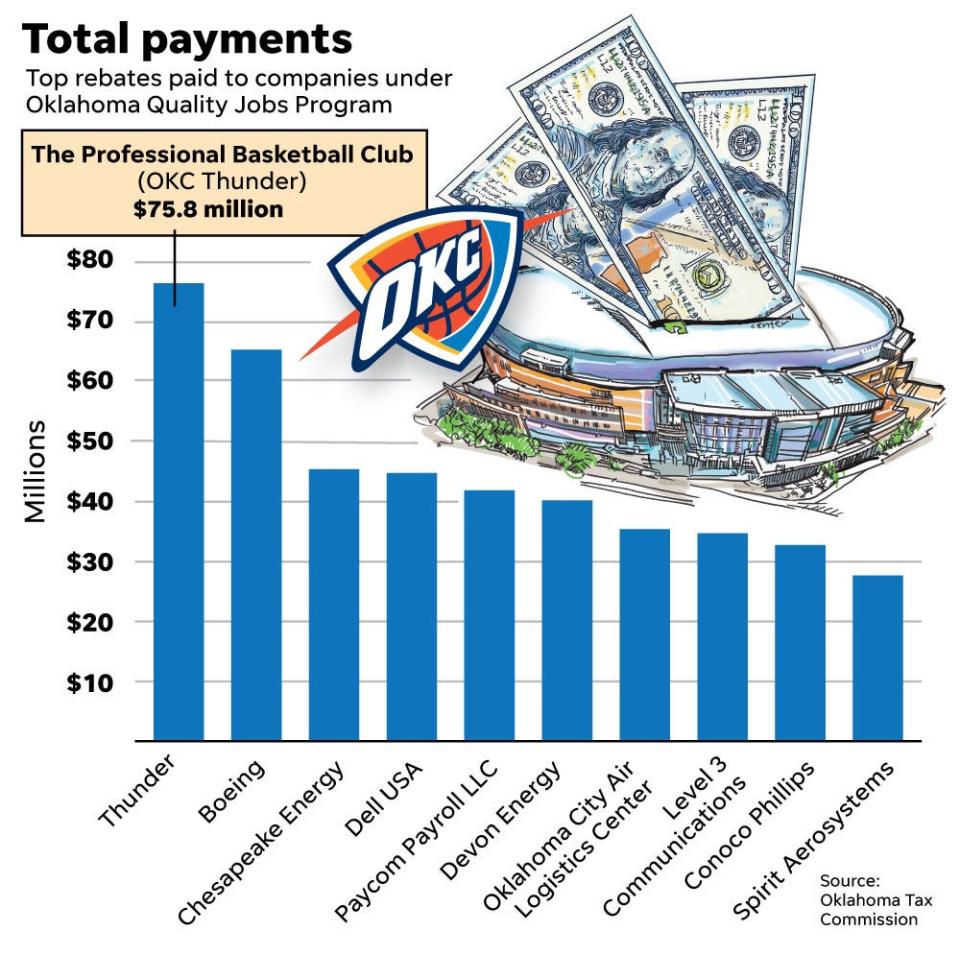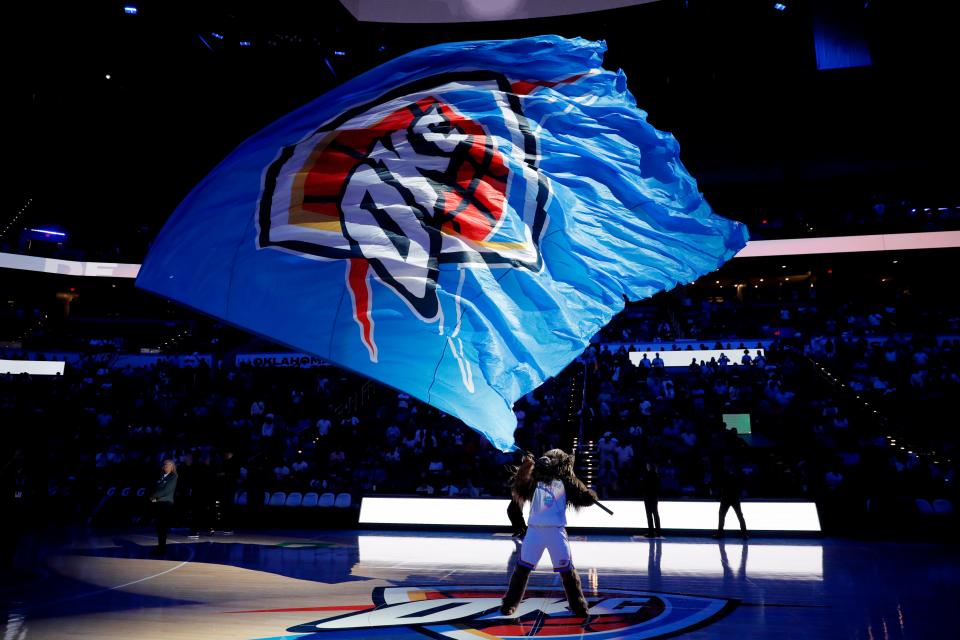As vote on NBA arena approaches, here's how much the state has paid OKC Thunder in incentives

The state of Oklahoma has sent quarterly payments to the Oklahoma City Thunder since 2009 that now total more than $75 million under an incentive program that was expanded to include the team as a condition for its relocation from Seattle.
The team, which receives rebates under the name The Professional Basketball Club, has received more money than any of the hundreds of participants in the Quality Jobs Program, including large aerospace and energy companies with far more employees. So far this year, the team has received payments of $1.17 million in March; $1.5 million in June; and $982,871 in September from the program.
As Oklahoma City voters go to the polls Dec. 12 to decide whether to finance a new arena for the team, one element that has been largely left out of the discussion is how much the team already receives in public subsidies. Voters will be asked to dedicate six years of revenue from a one-cent sales tax, along with $70 million from sales tax revenue that is part of MAPS 4, to build the arena, which has a minimum price tag of $900 million. The team has agreed to provide $50 million and play in the arena for 25 years if the city question is approved.
The team’s contract with the state program was certified by the Oklahoma Tax Commission in 2008 to be revenue neutral, meaning the economic benefits flowing from the team matched or outweighed the state payments. That is a requirement of all participants in the program. .
How OKC Thunder was able to receive the Quality Jobs Program incentive
Dan Mahoney, vice president for broadcasting and communications for the Thunder, said last week that the team qualified for the state incentive in 2008 as a new employer, “but it can’t be said that it was an absolute condition for relocation.”
In fact, the team didn’t qualify for the program until the Legislature approved a bill in 2008 specifically to expand the eligibility to professional sports teams. The bill passed by the Legislature gave the team 15 years of eligibility, while all other participants were limited to 10 years.
The team’s stipulation that it be allowed to participate in the Quality Jobs program was included in the letter of intent between the club and Oklahoma City before the team relocated from Seattle. There were other stipulations that also relied on public funding, including renovations to the downtown arena, then known as the Ford Center, and the construction of a practice facility, on a site chosen by the team.
More: OKC officials say a new Thunder arena is worth every penny. Economists aren't sold.
Though Oklahoma City residents have provided the bulk of the public subsidies for the Thunder, state taxpayers have chipped in an average of $5.3 million annually through the Quality Jobs program, Oklahoma Tax Commission figures show.
The program pays “rebates” tied to the payroll of the recipient. The goal is to encourage new and existing businesses to create well-paying jobs. There are thresholds required to keep receiving the payments, and those requirements are enforced. Since its inception in 1993, the quality jobs program for large employers has paid out $1.4 billion.
Large national corporations American Airlines and Boeing, which are among the top private employers in Oklahoma, have been among the biggest recipients. Tax commission records show Boeing entities have received about $64 million over the past 25 years. Oklahoma businesses Paycom, Devon Energy and Chesapeake have received more than $30 million each. The state program paid the federal government $37 million for creating additional jobs at the Oklahoma City Air Logistics Center, an aircraft repair depot, at Tinker Air Force Base.

Gateway Mortgage Group, the company founded by Gov. Kevin Stitt, and Gateway First Bank, formed after the company bought a bank in Cherokee, Oklahoma, have received a total of about $3.7 million. Stitt has not been involved with the bank’s operations since first taking office in 2019.
In 2022, Paycom, with more than 2,100 jobs in the program, received $4.5 million in rebates, according to tax commission figures, while the Thunder, with less than 250 jobs, received $5.3 million.
In a statement, the Oklahoma Tax Commission said it was prohibited under state law from responding to questions about specific taxpayers.
“Quality Job payments are calculated based upon payroll amounts multiplied by the net benefit rate as determined by the Department of Commerce,” the commission said. “Furthermore, Commerce establishes a maximum net benefit amount specific to each contract.”
Under the Quality Jobs program, the rebates are tied to income taxes paid by the employees. But companies aren’t required to distribute the rebates to the employees who paid the taxes, and the Thunder does not do that, according to a spokesman.
The team's participation was scheduled to end next year, and Mahoney told the Oklahoman early this month that he didn't know whether the Thunder would request an extension or seek another type of incentive.
In fact, the Oklahoma Legislature approved a 15-year extension in special session in May, after the team lobbied for it, according to a state senator. The extension became law in June without the governor's signature.
Part of the financial plan
The letter of intent between the team and Oklahoma City — which was drafted while the team was still in Seattle and playing as the SuperSonics — listed the state incentive among conditions for relocation.
“The Company will request that the State of Oklahoma provide economic incentives to the Team by enacting amendments to Oklahoma’s Quality Jobs Act. The Company and the City will work together to obtain passage of the necessary legislation as soon as practicable," the letter stated.
The bill allowing the team to participate was approved easily during the 2008 legislative session, though some lawmakers complained that it was corporate welfare and that the team would move to Oklahoma City without the payments.
Then-House Speaker Chris Benge, a Tulsa Republican, defended it, saying, "The owners of the team have put together a financial plan. This is part of that. They feel like they need this rebate to make the team profitable long term."
EDITORIAL: Why we support building a new arena
At the time, the cost over the 15-year contract with the team was estimated at $60 million, about $4 million a year. That was based on the team having 170 employees and a payroll of $74 million; the rebate cap was set then at 5.5%, the top income tax rate in 2008.
The first five years of rebates were less than $4 million; however, they have topped $4 million every year since. In 2018, the rebate was $8.2 million and, a year later, it was $7.9 million. From 2020 through 2022, the payments totaled $17.4 million.
The value of public subsidies for professional sports teams has been a source of debate for decades, and there have been many public-private variations in the financing of arenas and stadiums through the years.
The owners of the Thunder have argued both sides of the question of whether NBA teams provide economic benefits to a city.
In 2008, when they were trying to get out of an arena lease in Seattle to move the team to Oklahoma City, they employed an economist to say, during a trial, that there was "no detectable" impact on a metropolitan area from losing a professional football, baseball or basketball team.
Consumers spend their entertainment dollars on sports events, Brad Humphreys, then an economics professor at the University of Alberta, said during the trial, and would spend that money on other options in the area if there were no sports team.
"The Sonics clearly generate economic activity,” Humphreys said then. "The question is whether the Sonics generate new activity.”
Just weeks before, Clay Bennett, the leader of the Oklahoma investors who bought the team, had made the opposite argument in talking about the Quality Jobs Act inclusion of the team.
The passage of the bill that gave the team 15 years of rebates, Bennett said then, “sends a powerful message to the NBA and my fellow owners that the state of Oklahoma recognizes the value and understands the economic impact an NBA franchise will have on our state.”
NOTE: This story was updated on Oct. 22 to state that the Thunder lobbied for and received a 15-year extension of payments through the Quality Jobs program.
This article originally appeared on Oklahoman: State Quality Jobs program pays OKC Thunder millions more than Boeing

